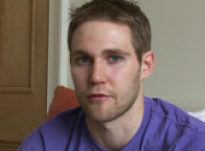Joe

Joe used to drink a lot at parties when he was a teenager. When he moved out of home he started to smoke cannabis regularly. For a time, Joe was going to drum & bass nights regularly where he would often use ecstasy. He has stopped using drugs and drinks alcohol less often because he has become more interested in health and fitness. He goes out to pubs and clubs far less often now.
Joe works in administration. He's single and shares a flat with friends. He is interested in health and fitness, jogs regularly and recently ran a marathon for charity.
More about me...
Joe lives in Scotland and thinks that the drug and alcohol health awareness campaigns there have had an impact on young people. He is more aware of the health risks associated with them.
Joe thinks young men are expected to get drunk and rowdy.
Joe thinks young men are expected to get drunk and rowdy.
When Joe turned 18 his friends expected him to drink beer instead of alcopops, because it’s considered a more ‘manly’ drink.
When Joe turned 18 his friends expected him to drink beer instead of alcopops, because it’s considered a more ‘manly’ drink.
Yeah and they’d go, “Oh why are you having a girl’s drink [Joe]?” You know that, just playful kind of banter, but yeah drawing attention to it and making you feel like you probably should have a pint yeah but never bullied to the point where they would pour my drink away and say, you know, “Have a pint instead.” But, yeah they’ve, they’ve made reference to it.
Joe describes an ecstasy comedown' as the drug equivalent of a hangover.
Joe describes an ecstasy comedown' as the drug equivalent of a hangover.
Joe preferred the taste of alcopops but switched to beer under pressure from his male friends.
Joe preferred the taste of alcopops but switched to beer under pressure from his male friends.
Joe says his mates will often have a few drinks to help them feel more confident about talking to girls.
Joe says his mates will often have a few drinks to help them feel more confident about talking to girls.
A year after Joe started smoking cannabis regularly, he started to experience paranoia.
A year after Joe started smoking cannabis regularly, he started to experience paranoia.
After trying cocaine twice and not experiencing any of the effects associated with it, Joe lost interest and never tried again.
After trying cocaine twice and not experiencing any of the effects associated with it, Joe lost interest and never tried again.
Around that time when I had tried ecstasy and I was in that sort of music scene, I had tried cocaine a couple of times which, I didn’t really feel anything from it at all, it just, it didn’t seem to have any effect to be honest , I never tried it by itself I’d only tried it once I’d had ecstasy but I didn’t notice any sort of immediate effects from it and so I only tried it I think two, maybe three times, never again because I just didn’t see the point and it didn’t seem to have any effect on me.
Joe describes how his attitude to drinking has changed over time. Now it’s more about occasional socialising.
Joe describes how his attitude to drinking has changed over time. Now it’s more about occasional socialising.
Joe talks about the alcohol awareness campaign in Scotland and how it changed his attitude to heavy drinking.
Joe talks about the alcohol awareness campaign in Scotland and how it changed his attitude to heavy drinking.
I’d, I’m trying to remember, what the, what the main catchphrase was but it had Drink Aware at the bottomyou know? and they were pretty vivid pictures, I remember that being quite a good campaign which made you think about, yeah it made you think about how much you’d have when you’re on a night out and, maybe if you were tempted to like get carried away and keep drinking, you know it made you stop and think
Joe mainly smoked cannabis at age nineteen after he moved out of his parents' house. He said that for about two years he was doing cannabis more often than drinking alcohol.
Joe mainly smoked cannabis at age nineteen after he moved out of his parents' house. He said that for about two years he was doing cannabis more often than drinking alcohol.
Yeah, about that. Smoked quite a lot when I was nineteen, once I’d moved out of home and moved into a flat with, with friends, and yeah I could smoke in, well I was smoking in my flat so I hadn’t done that at home, but there I felt I could so, probably had it more frequently and stopped smoking it when I was about nineteen, twenty suppose, yeah must have been about, just about twenty .

